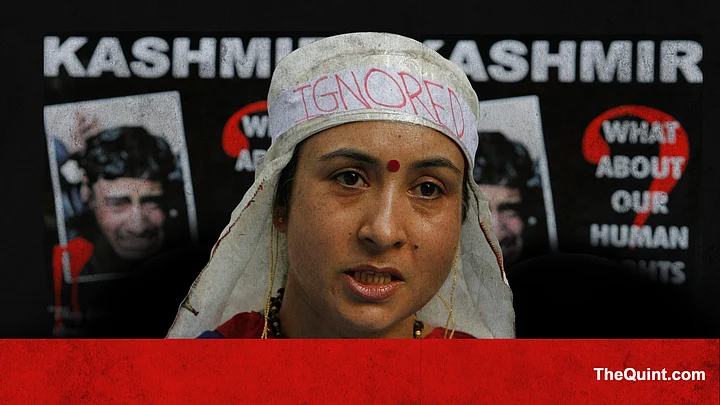Motley crowds of Kashmiri Pandits holding rallies and protest meetings every year on 19 January demanding their safe return to the valley is nothing but a farcical move. More ludicrous is the manner in which media covers this event for a day, and reactions from the state and central governments. The problem is that even after 26 years, Kashmiri Pandits are unable to accept the bitter reality that their numbers are far too less to have an electoral impact.
And, in a democracy it is numbers that count. No one doubts the enormity of their sufferings, but unlike Jews in the US or Parsis in India, they do not wield the kind of financial clout that can manoeuvre public opinion and force political parties to concede to their legitimate demands.
Kashmir Exodus Doesn’t Echo Anymore
Adding to their misfortune, they do not have a Steven Spielberg who can send shock waves by bringing heart-wrenching stories of their great escape from Kashmir alive on screen.
Our filmmakers can only think of filming atrocities against Kashmiri Muslims because that sells in a secular India. No wonder, the massacres of Pandits at Sangrampura (1997), Wandhama, Prankote (1998), Raghunath Temple (2002), Nadimarg (2003) and butchery of their 23 kids, women and children on the holiest night of Ramzan, coinciding with Shab-e-Qader does not interest Bollywood producers or move a Girish Karnad or Naseeruddin Shah or Anupam Kher to script plays.
Pandits, a Divided House
It was on 19 January 1990, when JKLF and Hizbul Mujahideen called upon the Pandits to either convert to Islam or leave. The warning soon turned into a threat when they started burning houses and killing Kashmiri Pandits in cold blood at regular intervals.
Today, they are less than one percent of their population in 1990. Barring 2000 Pandits who left to settle down in other parts of India, 40,668 have since been accommodated in nine camps of Jammu and another 19,338 have been rehabilitated in 15 camps of Delhi where they live in tents amidst unrelenting poverty and appalling living conditions.
Paradoxically, the Pandits are a divided house and speak in discordant voices. Some try to project their escape as an ‘exodus’ and victims of ‘genocide or ethnic cleansing’. Others disagree. NGOs and governments also contest numbers related to those who were killed and shrines that were destroyed.
Rehabilitating Kashmiri Pandits
- The problem is that even after 26 years, Kashmiri Pandits are unable to accept the bitter reality that their numbers are far too less to have an electoral impact.
- Lack of unity acts against the community and Kashmiri Pandits appear like a divided house speaking in discordant voices.
- They will never muster courage to go back, simply from assurances of a few marginal voices who don’t represent the majority.
- It is time the Pandits realise their political irrelevance and shun completely the doles and promises of governments.
- A rehabilitation programme can be chalked out with help of corporates that help Kashmiri Pandits start all over again.
When Will Their Wait Be Over?
Kashmiri Muslims hold Governor Jagmohan responsible for inciting the Pandits to leave, so that an impression of their religious persecution could be created. But the fact remains that almost an entire population of Kashmiri Hindus was uprooted from their land, that they live as refugees in their own state and country and are still waiting to return to the valley.
The question is, when their wait will be over. With ISIS and Pakistani flags being unfurled at the slightest provocation, Islamic terrorists fighting for a merger of Kashmir with Pakistan and overwhelming numbers of Muslim residents wanting independence, the nationalist Pandits will never muster courage to go back, simply from assurances of a few standing on the margin.
Their conditions of returning are also unlikely to be met with. No political party is going to give the Pandits a separate homeland in the southern part of Kashmir, build a separate composite township to house them, accord them minority status or reserve seats for them in the Assembly, as that will adversely affect their image of remaining committed to India’s much-hyped pluralism, diversity and secularism.
Corporate Houses Should Take a Step Forward
It is time the Pandits realise their political irrelevance and the need to abandon their ghettoes and stop dreaming about doles and promises of governments. That can be guaranteed alone by corporate leaders. Ideally the Pandits who have thriving businesses in other parts of India should have helped their kin but they are not Jews.
It is people like Azim Premji, Shiv Nadar, GM Rao and their likes who will have to come forward to champion the Pandits cause and be a catalyst for their long term rehabilitation in Jammu and outside, without making them compromise on any of their rights as residents of the state of J&K. It will of course require a lot of effort to persuade the Pandits to leave those ugly camps, but someone will have to start pulling them out of their wholly unreal world of expectations.
(The writer is a former Special Secretary, Cabinet Secretariat)
Also read:
Kashmiri Ex-Separatist Qureshi Denounces ‘Self-Appointed Leaders’
How Kashmiri Filmmakers Reacted to Three Bloody Summers of 2008-10
(At The Quint, we question everything. Play an active role in shaping our journalism by becoming a member today.)
